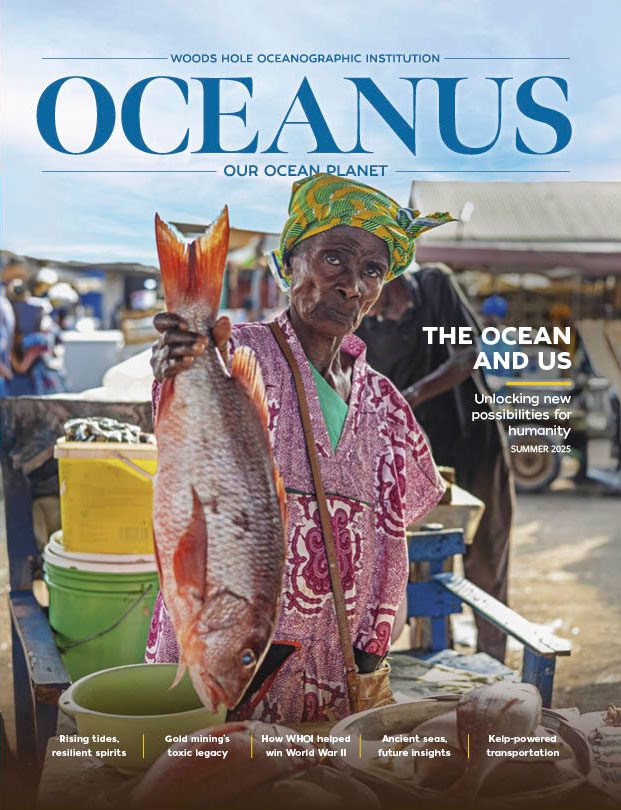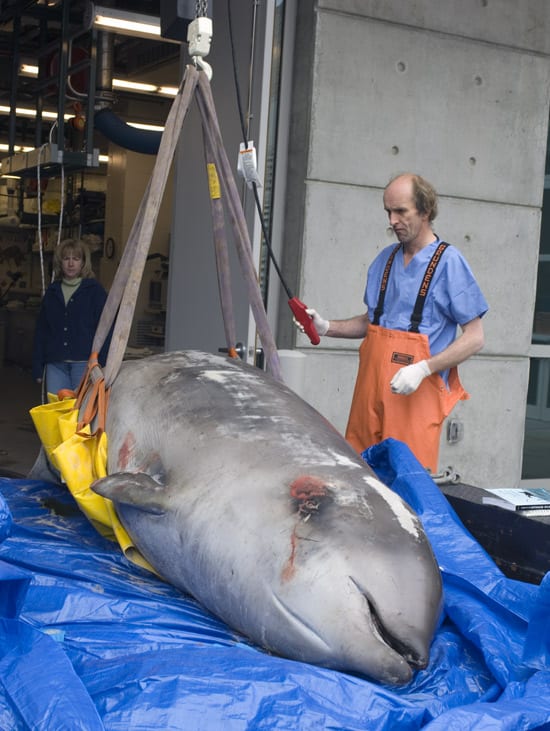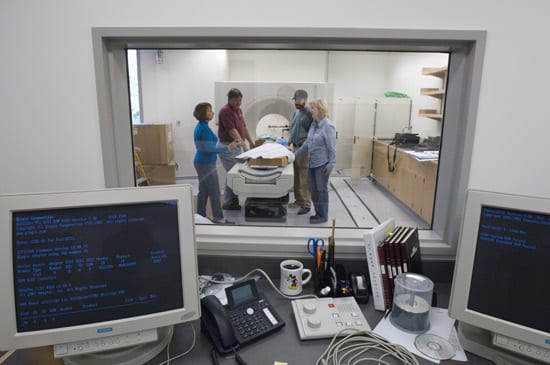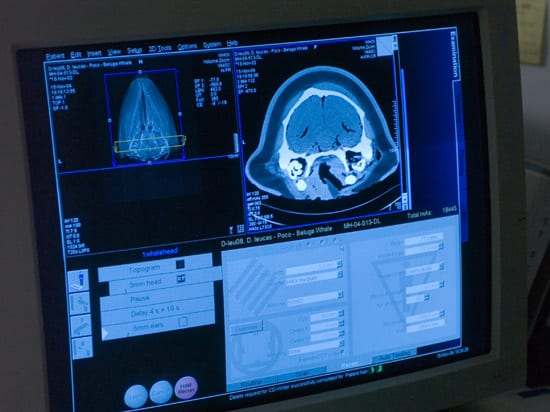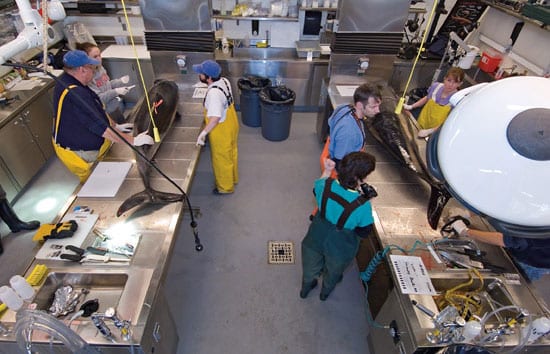
Mass Strandings Keep New Marine Mammal Facility Busy
In its first season, WHOI lab becomes a hub for cetacean research
Woods Hole Oceanographic Institution’s new Marine Research Facility (MRF) opened its doors just in time for a terribly busy winter season. An unprecedented number of fatal dolphin and whale strandings near Cape Cod brought many veterinarians and marine biologists to Woods Hole to examine and dissect the animals in the MRF’s necropsy suite and computed tomography (CT) scanning facilities.
More than 120 cetaceans beached themselves on the peninsula in December and January alone. A total of 178 cetaceans stranded in the whole of 2005, according to the Cape Cod Stranding Network (CCSN), which includes several WHOI researchers.
CCSN is charged by the National Marine Fisheries Service (NMFS) with managing stranded marine mammals and investigating why strandings occur. Their options include immediate release, transport to a rehabilitation facility if advisable and practical, or euthanasia in collaboration with WHOI biologist Michael Moore, who is a licensed veterinarian in the Commonwealth of Massachusetts.
“In January, we had a constant stream of mass strandings,” said Andrea Bogomolni, a research assistant at WHOI and CCSN member. “It was day after day, dolphin after dolphin.”
“At one point during one of the mass strandings, we had veterinarians and other researchers from WHOI, Tufts University, the National Oceanic and Atmospheric Administration, the Massachusetts Institute of Technology, the New England Aquarium all working in the necropsy lab at the same time,” Moore said. “We had three tables going and examined two animals on each table through the day, with many other animals in the freezer awaiting examination.”
A wide range of advantages
“This new facility has meant many things to us,” Bogomolni said. “It has a monorail system that delivers animals to the tables, and the table heights are adjustable. That means no more bad backs.
“The tables have a down-draft function, with the air being scrubbed in the penthouse before it is discharged. That means no more complaints about odor,” she continued. “We have space where collaborators can come and work with us with ease. The CT scanner on the premises lets us work with (WHOI biologist) Darlene Ketten’s research group to scan appropriate cases before they’re examined internally. And we have a really clean, sterile working area, allowing us to do good microbiology.”
Beyond the continuing research to determine the causes of strandings, funded by the NOAA John H. Prescott Marine Mammal Rescue Assistance Grant Program, Moore said, “the MRF facility opening coincided with the start of a major three-year project for us funded by the NOAA Ocean and Human Health Initiative.” That program investigates marine toxins and infectious diseases, chemical pollutants, coastal water quality and beach safety, seafood quality, and “sentinel species,” which can offer early warnings of both potential human health risks and of human impact on marine systems.
“We are assaying seals and dolphins, both stranded and bycaught (caught inadvertently in fishing nets) for evidence of zoonotic agents (which can spread diseases from animals to humans under natural conditions),” Moore said. The agents include such organisms as Brucella, Influenza, Giardia, Cryptosporidium, and Leptospira, he said.
Birds and beaked whales
Another facet of the project includes research on infectious agents in birds, collaborating with researchers at the Wildlife Clinic at Tufts Veterinary School and Cornell University, Moore said. “It will give us and the regional health authorities very useful background data, should avian influenza become a local issue.”
Strandings are common on Cape Cod, especially on the Outer Cape along the edge of Cape Cod Bay. Directed by Katie Touhey, the Cape Cod Stranding Network, covers 700 miles of coastline, with five employees and many volunteers, Bogomolni said.
In early April, the New England Aquarium brought a rare, 12-foot Cuvier’s beaked whale (Ziphius cavirostris), which had stranded on a beach south of Boston, to the MRF facility for forensic studies to try to determine what may have caused it to strand and die. Preliminary results indicate that the whale suffered from both chronic and acute diseases in several major organs, all of which may have contributed to its weakened state and stranding. It will be several months before all test results are available and final conclusions are reached.
Slideshow
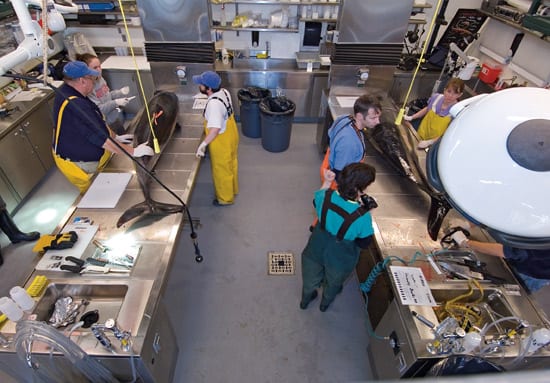
Slideshow
 Researchers from several institutions converged at the new Marine Research Facility at Woods Hole Oceanographic Institution to perform necropsies on common and white-sided dolphins that stranded on Cape Cod in January 2006. Necropsies help scientists investigate the causes of marine mammal strandings. (Photo by Tom Kleindinst, Woods Hole Oceanographic Institution)
Researchers from several institutions converged at the new Marine Research Facility at Woods Hole Oceanographic Institution to perform necropsies on common and white-sided dolphins that stranded on Cape Cod in January 2006. Necropsies help scientists investigate the causes of marine mammal strandings. (Photo by Tom Kleindinst, Woods Hole Oceanographic Institution)- The stranding of a 12-foot Cuviers beaked whale on a beach south of Boston in early April 2006 was a rare event in New England, although strandings of pilot whales and other marine mammals are not unusual. The New England Aquarium collaborated with WHOI to bring the beaked whale to the new necropsy/CT scanning facility at WHOI for forensic studies to try to determine whay may have caused it to strand and die. A monorail system moves large mammals through the faciltiy, where WHOI biologists Michael Moore (also a licensed veterinarian) and Darlene Ketten and others performed the necropsy. (Photo by Tom Kleindinst, Woods Hole Oceanographic Institution)
- In the fall of 2005, researchers moved into a new CT scan facilty (viewed from the control room window) in the new Marine Research Facility building at Woods Hole Oceanographic Institution. The CT scan provides scientists with views of animals' internal anatomy, traumas, and pathologies. (Photo by Tom Kleindinst, Woods Hole Oceanographic Institution)
- A computer screen in the WHOI CT scan facility shows a scan of the head of a beluga whale. The CT scan is used forensically to investigate why animals died and/or stranded themselves on beaches. It is also used to examine ear anatomy of marine mammals and other animals to examine how animals hear. (Photo by Tom Kleindinst, Woods Hole Oceanographic Institution)
